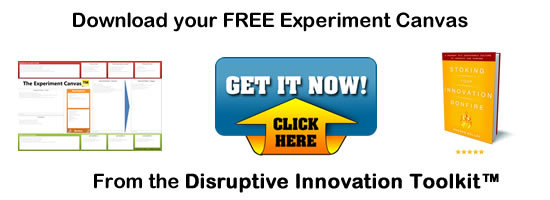The Biggest Impediment to Developing and Deploying Innovation

Command-and-control, top-down organizations have the most trouble innovating. In particular, the fearful mindsets that review, align, and sign off on “decks†to be presented to Vice President-level colleagues often edit out the insights and recommendations that have the power to grow the business in new ways.
These well-trained, obedient keepers of the status quo are rewarded for not taking risks and for not thinking outside of the existing paradigm of the business.
When we are assigned fretful, career-minded people to project teams we know that we must spend half of our time reorienting such people. Otherwise, the innovation project will implode under such fears as what will they think, can we give a preview to the VP of No, or how does this effect my bonus?
Notice that all of the above thinking conveys a myopic internally-focused view—and is contrary to where innovations tend to be discovered, namely in the market and with real people. This mindset lacks the exploratory and inquisitive nature required to break new ground and create new value.
Curiosity and openness are key prerequisites for this kind of work. A discovery process must be undertaken. Often, the output of an innovation project cannot be imagined beforehand; the findings can only be unveiled as the journey unfolds. Without open-minded exploration, possible solutions will be suffocated in infancies—and not nurtured to reach their potential.
Equally critical to success, if you want to become an innovative company, your employees will need to be doing some of the work themselves.
You cannot outsource this type of work and expect lasting results, just as your mountain Sherpa cannot actually walk for you and make a movie of the adventure for you to show at home. Your team has to experience the alchemy of change. Otherwise, they—and your organization—will not be able to accept new thinking about the business. This point may sound small, but it is the biggest impediment to developing and deploying innovation. If you are in a rigid and fixed system, innovation by design is impossible.
If you want to be able to innovate on a level deeper than cost cutting, stop with all of the small actions that seek to present only perfection up the food chain. Practice presenting work in different formats and in different stages of development. In other words, innovate how presentations to those in leadership positions are conducted.
To enter this Growth Mindset means to encourage your people to take risks, embrace possible failure, and aim for an ambitious goal. If the whole system of your culture rewards incremental thinking and has a bias for data, change the game. Set up the expectations of the meetings differently. Be and signify change. Remember, if you are tasked with innovation, you are hired to transform, not inform.
Why assign a lion to be a dog? Change, or don’t bother. As it has been said of advertising the same is true in this field: companies get the innovation results they deserve.
Wait! Before you go…
Choose how you want the latest innovation content delivered to you:
- Daily — RSS Feed — Email — Twitter — Facebook — Linkedin Today
- Weekly — Email Newsletter — Free Magazine — Linkedin Group
 Michael Graber is the managing partner of the Southern Growth Studio, an innovation and strategic growth firm based in Memphis, TN and the author of Going Electric. Visit www.southerngrowthstudio.com to learn more.
Michael Graber is the managing partner of the Southern Growth Studio, an innovation and strategic growth firm based in Memphis, TN and the author of Going Electric. Visit www.southerngrowthstudio.com to learn more.
NEVER MISS ANOTHER NEWSLETTER!
LATEST BLOGS
Three things you didn’t know about credit cards
Photo by Ales Nesetril on Unsplash Many of us use credit cards regularly. From using them for everyday purchases to…
Read MoreFive CV skills of a business-minded individual
Photo by Scott Graham on Unsplash The skills listed on a CV help employers quickly understand your suitability for a…
Read More


